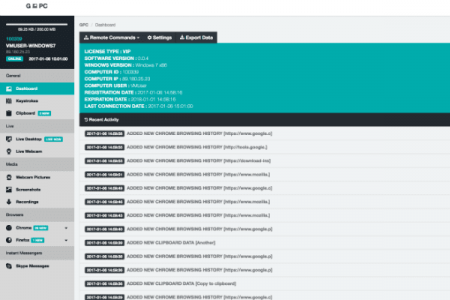In this category we have assembled the complete range of the very latest computer and PC monitoring tools and software available.
The Need For PC Surveillance
PC surveillance and monitoring is one of the fastest growing areas in the surveillance industry while the low starting price of available products has made this type of solution very affordable. With computers in every office and almost every home and with internet communication escalating, surveillance of computer activity is of paramount importance. Enter our tried and tested PC monitoring devices.
Types of PC Monitoring Tools
There are really three types of product available or a combination of these three. Keyloggers or Keystroke Loggers have been around for a number of years now. This type of device records every key that is struck on the computer keyboard. Our Voice Logger Computer Software is a perfect example of this type of product.
Classic Keyloggers or Keyboard Loggers are a piece of hardware that sits between the PS/2 or USB connection of the computer keyboard and the connector on the computer base unit. These keystroke loggers match the style of the keyboard plug, so effectively camouflaging their insertion. Recorded information is stored on the flash memory of the keystroke logger.
Through a menu/password system, the stored information can be retrieved on the computer on which it is installed or on another computer after the keylogger has been removed and re-inserted in the donor PC. There is a new type of keystroke logger that doesn’t require a piece of hardware to be left inserted into the computer. This software based keylogger sections off a portion of the hard drive to record keystrokes and also screenshots. None of the keyloggers interfere with anti-spyware or anti-virus software, so are perfectly safe.
Professional Computer Spying
Another type of computer spying that has been available for a number of years in various forms is total computer monitoring software. This is a complete suite of software tools on a disc. When uploaded onto the PC that is to be monitored a rule does have to be created to work around the anti-virus software, but one installed the software will log keystrokes, take screenshots, capture e-mail and Instant Messenger chat.
The final weapon in the armoury of computer monitoring is the remote monitoring software. Once installed on the PC, activity of that PC can be monitored remotely from anywhere in the world as long as both PC’s are Internet connected. When it comes down to PC Monitoring, Spy Equipment UK has every eventuality covered and at prices that everybody can afford. Browse our PC surveillance tools and contact us if you have any queries.














